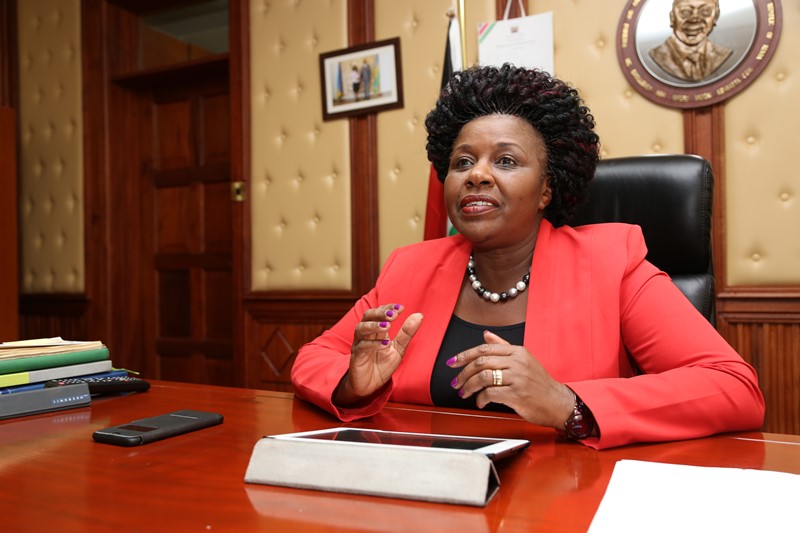NAIROBI, Kenya – Kenyans are set to make history by electing their first woman governor in the country’s national election on August 8. There are 47 counties up for grabs across Kenya, and nine women are putting their hands up to serve.
During the last election in 2013, six women ran for governor. They all stood either as independents or for fringe parties. This year, women represent the ruling Jubilee Party as well as a number of mainstream opposition parties.
At the presidential level, current president, Uhuru Kenyatta, who represents the Jubilee Party, is seeking reelection for a second term. The main opposition is the National Super Alliance (NASA), a coalition of five parties led by Raila Odinga. Most opinion polls show President Kenyatta slightly ahead of Odinga.
Women made up 19 percent of the last parliament’s members. This figure was in contravention of an affirmative action law laid out in the 2010 constitution, which stated that women should make up at least one-third of all elected bodies.
Women Go Head to Head in Kirinyaga
In central Kenya’s Kirinyaga county, about 75 miles north of Nairobi, the governor’s race has narrowed to a contest between two women candidates: Anne Waiguru and Martha Karua. This makes breaking the country’s gubernatorial glass ceiling this year almost inevitable.
A recent opinion poll shows Waiguru, who is running on the ruling Jubilee Party’s ticket, is ahead at 55 percent, followed by Karua, representing the National Rainbow Coalition-Kenya (NARC-Kenya), at 35 percent. Current governor Joseph Ndathi, formerly of the Jubilee Party but running as an independent, trails at 3 percent.
“If elected as governor for Kirinyaga, I will prioritize agriculture and health, the key sectors that involve women,” Waiguru told News Deeply.
Waiguru, Kenyatta’s former devolution Cabinet secretary, resigned in 2015 following allegations of corruption in her ministry, tasked with transferring power from the central government to the 47 counties.
Kenya’s Integrity Alliance had campaigned for Waiguru to be barred from running for governor, but she was cleared by the Independent and Electoral Boundaries Commission in June.
Karua, originally a lawyer, has been in politics for two decades – she is known as Kenya’s “Iron Lady.” In 1992, she became the first woman lawyer to be popularly elected to parliament. She was the NARC party’s presidential candidate in 2013, when she won 0.36 percent of the national vote, and held two ministries under the administration of Kenyatta’s predecessor, Mwai Kibaki.
While Waiguru says she will focus on land rights and development, Karua says she will ensure proper management of resources and zero tolerance for corruption in the county.
“If elected I will fully commit to serving the people of Kirinyaga,” Waiguru said, adding that she is “not one who is out to gain political relevance.”
She said that she will prioritize health and agriculture and focus on supporting small and medium businesses to improve trade and investment in the county.
Karua said she will prioritize education by increasing funds to the sector. She also pledges to provide better infrastructure to link up the county’s resource-rich areas.
A Clear Win for Women
Herman Manyora, a language and communications lecturer at the University of Nairobi and an independent political analyst, said overall, two or three women are likely to be elected governor on August 8.
“Already there is a clear win for a woman governor in Kirinyaga County,” he said. “The other two are likely to come from either Machakos, Taita Taveta or Bomet counties where the race is tight, and women candidates are either leading or slightly behind their male opponents.”
Joyce Laboso is running in Bomet County. The Kenyan parliament’s most recent deputy speaker and a former lecturer at Egerton University, Laboso is standing on the Jubilee Party ticket. She is hoping to unseat the county’s current governor, Isaac Rutto of the Chama Cha Mashinani Party, affiliated with the NASA coalition.
A survey conducted by Infotrak Research and Consulting in April showed the two candidates are neck-and-neck with the incumbent at 38.9 percent and Laboso at 37.7 percent.
“If you empower women, then everyone in the community benefits,” Laboso said in an interview.
“Through self-help groups, I will give funds that will enable women to start businesses or set up income-generating projects.”
Harassment and Violence
Laboso noted that her main challenge during the campaign has been the bullying she faces from men.
“I have been told several times that I am not [the] man to run for the seat,” she said of her male critics. “At times they jeer me when I am addressing crowds and dismiss me in the open.”
Women candidates and supporters have already faced violence, intimidation and abuse in the lead-up to the election. Parliamentary candidate Millie Odhiambo had her house burnt down, while other women have been attacked and even held hostage.
Manyora said women in Kenya have been locked out of most of the political seats because they lack the same political support as their male counterparts.
“Women … face very high expectations from the community,” he said. “They have a task to prove they can make change compared to male governors.”
But Waiguru said Kenya’s women candidates are up to that challenge.
“It is time Kenyans got over the mentality that political seats are only for men. Women must fight for their political space to deliver their dreams.”
